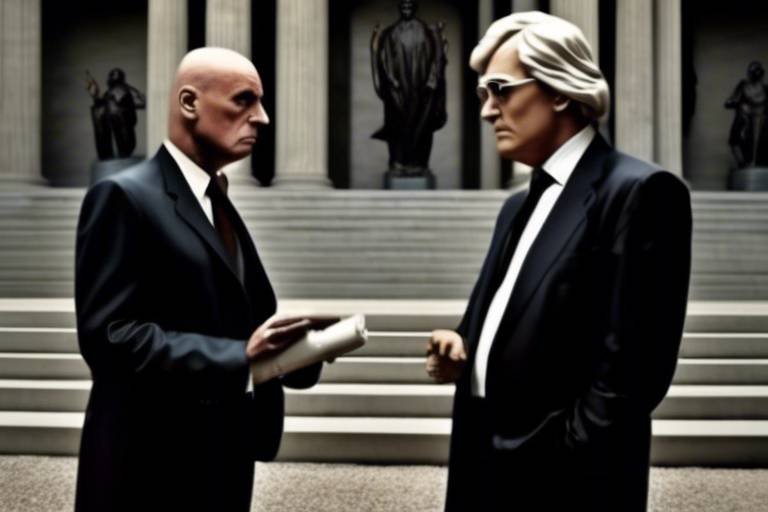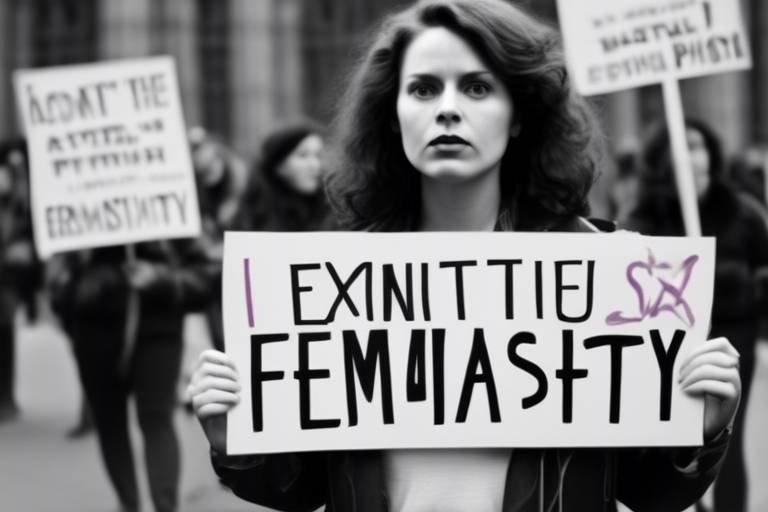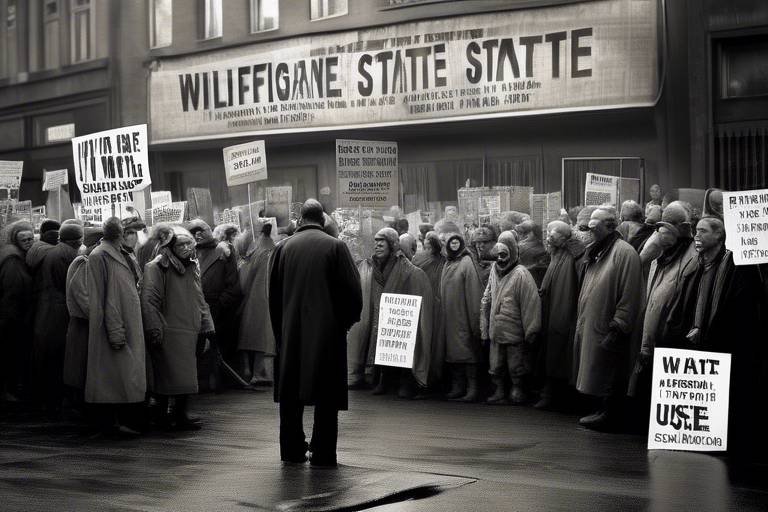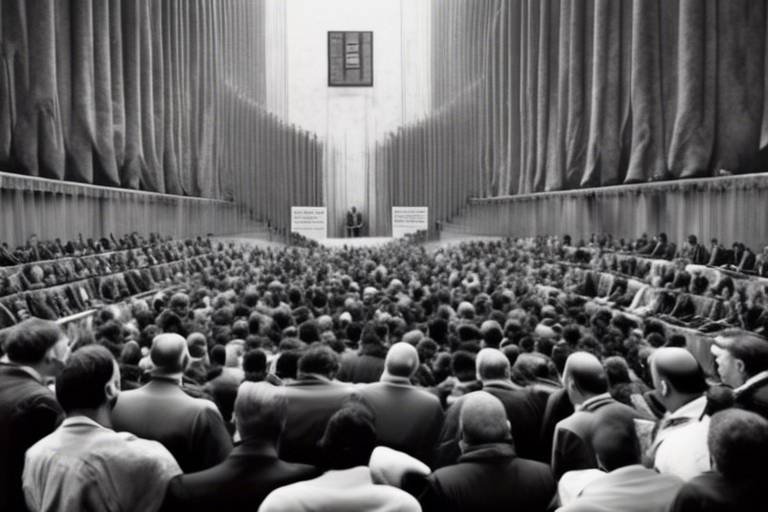The Politics of Freedom - Philosophical Views
Freedom is a concept that has captivated thinkers, politicians, and citizens alike for centuries. It is not merely a word; it embodies the essence of human existence and the quest for autonomy. When we talk about freedom, we often think about the ability to make choices without constraints. However, the politics of freedom is a complex tapestry woven from various philosophical threads that challenge our understanding of what it means to be truly free. This article will explore the multifaceted nature of freedom, diving into historical perspectives, political theories, and contemporary implications that shape our societal norms and governance.
To grasp the full depth of freedom, we must first look back at how it has evolved through history. Different eras and cultures have defined and valued freedom in unique ways, influencing political structures and societal norms. For instance, in ancient Greece, freedom was closely tied to citizenship and participation in civic life, while in the Enlightenment era, thinkers like Rousseau and Kant began to emphasize individual autonomy. The struggle for freedom has often been a struggle against oppression, whether it be colonial rule, slavery, or authoritarian regimes. As we trace the lineage of freedom, we see how it has morphed into a fundamental human right recognized by international laws today.
Political theories provide distinct interpretations of freedom, each proposing unique frameworks for understanding individual rights and state responsibilities. Two primary schools of thought dominate this discourse: liberalism and socialism. Liberalism emphasizes individual rights and personal autonomy, advocating for minimal state interference in personal choices. This perspective has significantly shaped modern democratic principles and civil liberties. Conversely, socialism challenges the liberal notion of freedom by advocating for collective ownership and social equality. It argues that true freedom cannot exist without addressing systemic inequalities and prioritizing the well-being of the community over individualism.
At the heart of liberalism is the belief in individual rights as the cornerstone of a just society. Thinkers like John Locke and John Stuart Mill laid the groundwork for this ideology, arguing that the protection of individual freedoms is essential for societal progress. They championed the idea that every person has the right to life, liberty, and property, and that the government's role is to safeguard these rights. However, the liberal approach is not without its critiques. Detractors argue that it can lead to social inequality, suggesting that a balance must be struck between individual rights and collective responsibilities to ensure a functioning democracy.
Locke and Mill are pivotal figures in liberal thought. Locke's social contract theory posits that the legitimacy of government derives from its protection of individual rights. Mill, on the other hand, emphasizes the importance of personal freedom, famously stating that "over himself, over his own body and mind, the individual is sovereign." Their contributions have profoundly influenced modern democratic governance, shaping the way we view rights and responsibilities in society.
While liberalism advocates for personal freedom, critics argue that it often overlooks the social context in which individuals exist. They contend that a purely individualistic approach can exacerbate inequalities, leading to a society where the rich get richer while the poor struggle for basic rights. This critique highlights the necessity of integrating collective responsibility into the framework of freedom, ensuring that the rights of the individual do not come at the expense of the community.
In stark contrast to liberalism, socialist thought posits that true freedom is achieved through collective ownership and social equality. This perspective argues that individual liberties can be compromised in a system that prioritizes profit over people. Socialists believe that a just society must prioritize community well-being, advocating for policies that aim to reduce disparities and ensure that everyone has access to the resources they need to thrive. This approach redefines freedom, suggesting that it is not merely the absence of restraint but the presence of equitable opportunities.
Existentialist philosophers, such as Jean-Paul Sartre, delve into the nature of freedom as an intrinsic part of human existence. They emphasize personal responsibility and the burden of choice in a seemingly indifferent universe. For existentialists, true freedom involves embracing one's authentic self, often in opposition to societal expectations and norms. This perspective encourages individuals to confront the absurdity of life, finding meaning and freedom within the chaos of existence.
Existentialists argue that authenticity is crucial for true freedom. To be free is to acknowledge one’s desires and make choices that align with one’s true self, rather than conforming to external pressures. This journey toward authenticity can be daunting, as it often requires individuals to break away from societal norms and expectations, but it is deemed essential for achieving genuine freedom.
The concept of the absurd highlights the conflict between the human desire for meaning and the indifferent universe. This struggle prompts individuals to seek personal freedom, even when faced with existential dread. Embracing the absurd can lead to a profound sense of liberation, as it allows individuals to define their own purpose and exercise their freedom in a world that often seems chaotic and meaningless.
In today's political landscape, discussions around freedom are more relevant than ever. Issues such as surveillance, free speech, and social justice challenge traditional notions of liberty. The rise of technology has transformed the way we experience freedom, offering tools for empowerment while also posing threats to privacy and autonomy. As we navigate this digital age, we must critically assess how technology impacts our freedoms and consider the balance between security and liberty.
Technology plays a dual role in contemporary freedom. On one hand, it provides platforms for expression and mobilization, empowering individuals to advocate for their rights. On the other hand, it raises critical questions about privacy and autonomy. The surveillance state, for instance, poses significant challenges to individual freedom, as governments and corporations collect vast amounts of personal data. This reality forces us to confront the paradox of freedom in the digital age and consider how we can safeguard our liberties while embracing technological advancements.
Freedom is not a monolithic concept; it varies significantly across cultures and nations. Different historical and social contexts shape how freedom is interpreted and practiced worldwide. For example, while some countries prioritize individual liberties, others emphasize collective rights and responsibilities. This diversity leads to a rich tapestry of political systems, each reflecting unique values and beliefs about what it means to be free.
- What is the main difference between liberalism and socialism in terms of freedom?
Liberalism focuses on individual rights and minimal state interference, while socialism emphasizes collective ownership and social equality. - How do existentialist views redefine freedom?
Existentialists see freedom as the ability to embrace one's authentic self and make conscious choices, often against societal norms. - What role does technology play in contemporary discussions about freedom?
Technology can empower individuals but also poses threats to privacy and autonomy, raising important questions about the balance of freedom in the digital age.

[Historical Perspectives on Freedom]
Understanding the evolution of freedom through history reveals a rich tapestry of ideas and cultural shifts that have shaped our contemporary views. From ancient civilizations to modern democracies, the concept of freedom has been defined, redefined, and often contested. In ancient Greece, for instance, freedom was closely tied to citizenship and the ability to participate in political life. Only free men could engage in the democratic process, while women and slaves were excluded, highlighting a limited and often exclusionary view of freedom.
As we move through history, the Enlightenment period marked a significant turning point. Thinkers like Rousseau and Voltaire began to argue for the inherent rights of individuals, suggesting that freedom should not be reserved for a select few but should be a universal principle. This shift laid the groundwork for modern democratic ideals, emphasizing that freedom is a fundamental human right that transcends social class and gender.
Fast forward to the American and French Revolutions, where the cries for liberty and equality echoed through the streets. These revolutions were not just political upheavals; they represented a collective yearning for a society where individuals could express themselves freely and pursue their own happiness. The philosophical underpinnings of these movements were deeply influenced by Enlightenment thinkers, and they sparked a global conversation about the nature of freedom.
However, history also teaches us that the pursuit of freedom has often been fraught with contradictions. For example, while the American Revolution proclaimed the right to liberty, it simultaneously upheld systems of slavery and oppression. This paradox raises essential questions about whose freedom is prioritized and at what cost. The ongoing struggle for civil rights throughout the 19th and 20th centuries further illustrates how the definition of freedom has expanded to include not just political rights but also social and economic justice.
Today, we find ourselves in a world where the meaning of freedom continues to evolve. The rise of global movements advocating for human rights and social justice reflects a collective understanding that true freedom cannot exist without equality and respect for all individuals. This historical perspective on freedom is crucial for grasping the complexities of contemporary political discourse.
As we reflect on these historical narratives, it becomes clear that freedom is not a static concept but a dynamic force that shapes and is shaped by societal values and struggles. It invites us to ask: How do we define freedom in our own lives today? What lessons can we learn from history to ensure that our pursuit of freedom remains inclusive and just?
- What is the historical significance of freedom? Freedom has been a central theme in political thought, influencing revolutions and movements throughout history.
- How have definitions of freedom changed over time? Definitions of freedom have evolved from a focus on political rights for select groups to a broader understanding that includes social and economic justice.
- What role did Enlightenment thinkers play in shaping modern views of freedom? Enlightenment thinkers emphasized individual rights and universal principles of freedom, laying the groundwork for modern democracies.

[Theories of Political Freedom]
When we dive into the realm of political freedom, we encounter a rich tapestry of theories that offer unique lenses through which to view the concept of freedom itself. Each theory brings its own flavor, shaping our understanding of individual rights, state responsibilities, and the delicate balance between personal autonomy and collective good. It's like stepping into a vibrant marketplace of ideas, where liberalism and socialism are just two of the many stalls vying for our attention.
At the heart of political freedom lies the question: what does it truly mean to be free? Is it the absence of constraints, or is it the presence of opportunities? Liberalism asserts that freedom is fundamentally about individual rights and personal autonomy. It champions the idea that individuals should have the liberty to make choices about their lives, free from excessive interference by the state. This perspective has profoundly influenced modern democratic principles and civil liberties, laying the groundwork for societies that prioritize personal choice. Think of it as a garden where each flower represents an individual, flourishing best when given the space to grow without being overshadowed by larger plants.
However, not everyone agrees with the liberal view. Critics argue that an unrestrained focus on individualism can lead to social inequalities, creating a divide between those who have access to resources and those who do not. This critique highlights the importance of finding a balance between individual rights and collective responsibilities, suggesting that true freedom cannot exist in a vacuum. In this light, socialism emerges as a counterpoint, advocating for collective ownership and social equality. Socialists argue that freedom is not just about personal choices but also about ensuring that all individuals have equal access to the resources necessary to make those choices. It’s like a community potluck, where everyone brings something to the table, ensuring that no one goes hungry while also celebrating the contributions of each member.
To further understand these theories, let’s consider a few key thinkers who have shaped the discourse:
| Thinker | Theory | Key Contribution |
|---|---|---|
| John Locke | Liberalism | Advocated for natural rights and the social contract. |
| John Stuart Mill | Liberalism | Emphasized the importance of individual liberty and harm principle. |
| Karl Marx | Socialism | Critiqued capitalism and proposed collective ownership of means of production. |
These thinkers have not only influenced political theory but have also sparked debates that continue to resonate today. For instance, while liberalism focuses on the individual's right to pursue happiness, socialism raises questions about the societal structures that either facilitate or hinder that pursuit. It’s an ongoing conversation, much like a lively debate at a dinner party, where each guest brings their perspective to the table, enriching the overall dialogue.
As we navigate through these theories, it becomes evident that the discourse on political freedom is not just theoretical; it profoundly impacts our daily lives. The balance between individual rights and collective responsibilities is a tightrope walk that societies must continually negotiate. In the end, the theories of political freedom serve as a compass, guiding us through the complex interplay of autonomy, equality, and justice in our ever-evolving political landscape.
- What is the main difference between liberalism and socialism? Liberalism emphasizes individual rights and personal freedom, while socialism focuses on collective ownership and social equality.
- How do these theories impact modern governance? They shape policies related to civil liberties, economic systems, and social welfare, influencing how governments balance individual rights with societal needs.
- Can these theories coexist? Yes, many modern political systems incorporate elements from both theories, striving for a balance between individual freedoms and collective responsibilities.

[Liberalism and Individual Rights]
Liberalism, at its core, champions the idea of individual rights and personal autonomy. This philosophical framework proposes that every person should have the freedom to make choices about their own life, free from excessive interference by the state or other entities. Imagine living in a world where your personal decisions—whether about your career, relationships, or beliefs—are entirely your own. This is the essence of liberal thought: the belief that individuals are best suited to determine their own paths. As we delve deeper into this concept, it becomes clear how profoundly it has influenced modern democratic principles and civil liberties.
One of the most compelling aspects of liberalism is its insistence on protecting individual freedoms, which are often enshrined in law. Think of it as a shield that guards against tyranny and oppression. The Bill of Rights in the United States is a prime example, providing a legal framework that protects freedoms such as speech, assembly, and religion. These rights are not merely privileges; they are considered fundamental to a just society. But the question arises: how do we balance these rights with the needs of the community? This is where the dialogue becomes intricate and sometimes contentious.
Key thinkers such as John Locke and John Stuart Mill laid the groundwork for liberal thought. Locke argued that individuals possess natural rights to life, liberty, and property, which the government must protect. Mill took this further, advocating for the protection of individual freedoms as essential to societal progress. He famously stated, "Over himself, over his own body and mind, the individual is sovereign." This idea of sovereignty over oneself is pivotal in understanding how liberalism views individual rights.
However, despite its strengths, liberalism is not without its critiques. Detractors argue that an overemphasis on individual rights can lead to social inequality. For instance, when the focus is solely on personal freedom, the needs of marginalized groups may be overlooked. This raises important questions about the role of the state in ensuring that freedom does not come at the expense of social justice. In essence, while liberalism advocates for personal autonomy, it also invites a conversation about the responsibility individuals have towards one another within a community.
In conclusion, liberalism's emphasis on individual rights has profoundly shaped our understanding of freedom in contemporary society. It challenges us to consider not just what it means to be free, but also how we can create a society where everyone's rights are respected and protected. As we navigate the complexities of modern governance, the principles of liberalism continue to serve as a foundational pillar for discussions surrounding freedom and responsibility.
- What is the main idea behind liberalism? Liberalism advocates for individual rights and personal autonomy, emphasizing minimal state interference in personal choices.
- Who are some key thinkers in liberalism? John Locke and John Stuart Mill are significant figures who contributed to liberal thought.
- What are the criticisms of liberalism? Critics argue that liberalism can lead to social inequality and may overlook the needs of marginalized groups.
- How does liberalism impact modern democracy? Liberalism has shaped democratic principles and civil liberties, influencing laws that protect individual freedoms.

[Key Thinkers in Liberalism]
When we talk about the foundations of liberalism, we can't overlook the profound impact of its key thinkers. Two names that often come to mind are John Locke and John Stuart Mill. Their ideas have shaped not only liberal philosophy but also the very fabric of modern democratic societies. Locke, often referred to as the father of liberalism, argued passionately for the concept of natural rights. He believed that every individual is entitled to life, liberty, and property, and that the primary role of government is to protect these rights. This notion laid the groundwork for many democratic principles we cherish today.
Locke's influence extends beyond just political theory; he introduced the idea of the social contract, which posits that governments derive their authority from the consent of the governed. This was revolutionary! Imagine a world where rulers are not absolute but are accountable to the people. This idea sparked a flame that ignited revolutions and inspired countless democratic movements around the globe.
On the other hand, we have John Stuart Mill, a philosopher who took liberal thought a step further. Mill championed the idea of individual liberty and the importance of personal autonomy. He famously stated, "Over himself, over his own body and mind, the individual is sovereign." Mill recognized that while individual freedom is paramount, it must be balanced with the rights of others. His work, On Liberty, advocates for the protection of free speech and expression, arguing that a society thrives when diverse opinions are allowed to flourish.
To understand their contributions better, let's summarize some key ideas from these thinkers in the table below:
| Thinker | Main Contributions |
|---|---|
| John Locke |
|
| John Stuart Mill |
|
These thinkers not only laid the philosophical groundwork for liberalism but also sparked debates that continue to resonate today. Their ideas invite us to question: How much freedom is too much? And can individual rights coexist with the needs of the community? These questions remain at the heart of political discourse, challenging us to find a balance between personal liberty and social responsibility.
In conclusion, the contributions of Locke and Mill are invaluable in understanding the evolution of liberal thought. Their insights remind us that the pursuit of freedom is not just an individual endeavor but a collective journey towards a more just and equitable society.
Q: What is liberalism?
A: Liberalism is a political and moral philosophy that emphasizes individual rights, personal autonomy, and limited government intervention in personal matters.
Q: Who are the key thinkers in liberalism?
A: Key thinkers include John Locke, who introduced the concept of natural rights, and John Stuart Mill, who focused on individual liberty and the importance of free speech.
Q: How does liberalism impact modern society?
A: Liberalism has significantly influenced modern democratic principles, civil liberties, and the way governments operate, promoting the protection of individual rights.
Q: What are some critiques of liberalism?
A: Critics argue that liberalism can lead to social inequality and emphasize the need for a balance between individual rights and collective responsibilities.

[Critiques of Liberalism]
Liberalism, while championing individual rights and personal freedoms, has faced significant critiques over the years. Detractors argue that this ideology, in its quest to prioritize the individual, often overlooks the broader implications of social inequality. One of the most prominent criticisms is that liberalism can inadvertently foster a society where wealth and power become concentrated in the hands of a few, leaving marginalized groups at a disadvantage. This phenomenon raises the question: can true freedom exist in a system where not everyone has equal access to resources?
Moreover, critics assert that the liberal emphasis on personal autonomy can lead to a form of social isolation. In a world where individualism is celebrated, community bonds may weaken, and the sense of collective responsibility diminishes. This perspective posits that when individuals prioritize their own rights above communal well-being, it can create a rift in societal cohesion. The challenge, then, is to find a balance between respecting personal freedoms and fostering a sense of community.
Another significant critique comes from the perspective of social justice advocates, who argue that liberalism often fails to address systemic injustices. Issues such as race, gender, and economic status are sometimes sidelined in liberal discourse. Critics contend that merely ensuring equal rights under the law does not translate into true equality in practice. For instance, while laws may protect individual rights, they do not necessarily dismantle the social structures that perpetuate inequality. This leads to a crucial debate: how can liberalism evolve to better address these systemic issues?
To illustrate these critiques, consider the following table that summarizes key points of contention against liberalism:
| Critique | Description |
|---|---|
| Social Inequality | Liberalism may perpetuate wealth and power disparities, undermining true freedom for all. |
| Social Isolation | Emphasis on individualism can weaken community bonds and collective responsibility. |
| Systemic Injustice | Focus on legal rights overlooks deeper social structures that maintain inequality. |
In conclusion, while liberalism has undoubtedly shaped modern democratic principles, its critiques highlight the need for a more nuanced approach that balances individual rights with social responsibilities. The ongoing dialogue surrounding these critiques is essential for evolving political thought and ensuring that freedom is genuinely accessible to all members of society.
- What are the main critiques of liberalism? Critics argue that liberalism can lead to social inequality, social isolation, and a failure to address systemic injustices.
- How does liberalism affect community bonds? The focus on individualism in liberal thought may weaken community ties and diminish collective responsibility.
- Can liberalism adapt to address critiques? Yes, ongoing discussions aim to evolve liberalism to better balance individual rights with social justice and equality.

[Socialism and Collective Freedom]
Socialism presents a compelling challenge to the traditional liberal notion of freedom, which often prioritizes individualism and personal autonomy. Instead, socialism posits that true freedom cannot be fully realized in a system that allows for vast inequalities in wealth and power. In this view, freedom is not merely the absence of interference but rather the presence of conditions that enable all individuals to thrive collectively. Imagine a community where resources are shared equitably; this is the essence of collective freedom. It emphasizes that one's freedom is inherently linked to the freedom of others.
At its core, socialism advocates for collective ownership of the means of production, arguing that when resources are owned and managed by the community rather than by private individuals, everyone has a stake in the system. This approach aims to dismantle the barriers that prevent many from achieving their potential. In a socialist framework, the idea is that by prioritizing community well-being over individual profit, society can foster a more equitable distribution of resources, ensuring that basic needs—such as healthcare, education, and housing—are met for all. This leads to a more inclusive society where people can pursue their goals without the constant pressure of economic insecurity.
Furthermore, socialism challenges the notion that individual rights can exist in a vacuum. It argues that individual freedoms are often compromised in a capitalist society where economic power translates into political power. In this sense, the freedom to make choices is often limited by the socio-economic conditions individuals face. For instance, a person may desire to pursue higher education but may be unable to do so due to prohibitive costs. Thus, socialism emphasizes the importance of creating conditions that enable genuine choices for everyone, rather than just a privileged few.
Critics of socialism often raise concerns about the potential for state overreach and the suppression of individual liberties. However, proponents argue that a well-structured socialist system can provide a framework for democratic governance, where the collective will is expressed through participatory processes. This can take various forms, such as community assemblies and cooperatives, which empower individuals to have a say in decisions that affect their lives. In this way, socialism seeks to marry individual rights with collective responsibilities, creating a balance that fosters both personal and communal well-being.
To illustrate the differences between socialism and liberalism in terms of freedom, consider the following table:
| Aspect | Liberalism | Socialism |
|---|---|---|
| Definition of Freedom | Absence of interference in personal choices | Collective well-being and equitable resource distribution |
| Ownership | Private ownership of resources | Collective ownership of the means of production |
| Focus | Individual rights and autonomy | Community rights and social equality |
| Role of the State | Minimal state intervention | Active role in ensuring equity and resource distribution |
In conclusion, socialism redefines freedom by intertwining it with the collective welfare of society. It invites us to reconsider our understanding of what it means to be free in a world where our fates are interconnected. By advocating for a system that prioritizes social equality and community support, socialism offers a vision of freedom that is not just about individual liberties but about ensuring that everyone has the opportunity to thrive.
- What is the primary goal of socialism?
The primary goal of socialism is to achieve social and economic equality by promoting collective ownership and ensuring that resources are distributed equitably among all members of society.
- How does socialism differ from communism?
While both socialism and communism advocate for collective ownership, socialism allows for some degree of private ownership and democratic governance, whereas communism seeks to eliminate private ownership entirely and establish a classless society.
- Can socialism coexist with democracy?
Yes, many socialist movements advocate for democratic processes, allowing citizens to participate in decision-making while pursuing social and economic reforms.

[Existentialist Views on Freedom]
Existentialist philosophers, such as Jean-Paul Sartre and Simone de Beauvoir, delve deep into the concept of freedom, viewing it as an essential component of human existence. Unlike traditional views that often link freedom to external factors such as laws or societal structures, existentialists argue that true freedom lies within the individual. This perspective invites us to consider the weight of our choices and the responsibility that comes with them. Have you ever felt overwhelmed by the multitude of decisions you face daily? That feeling is precisely what existentialists explore—freedom is not just about having choices but also about owning the consequences of those choices.
For existentialists, freedom is intertwined with the notion of authenticity. To be authentic means to embrace one's true self, making choices that resonate with personal values rather than conforming to societal expectations. This can be a daunting task; it requires introspection and courage. Imagine standing on a precipice, the vast unknown ahead of you. The leap represents the act of choosing to live authentically, despite the fears and doubts that may arise. This journey towards authenticity is not just a philosophical exercise but a vital aspect of living a fulfilled life.
Another fascinating aspect of existentialist thought is the concept of the absurd. This idea highlights the conflict between our innate desire for meaning and the indifferent universe that often seems to offer none. Sartre famously stated, “We are condemned to be free,” suggesting that freedom is both a gift and a burden. In confronting the absurd, individuals are prompted to carve out their own meanings and values, finding personal freedom in the struggle against the chaos of existence. This process can be liberating; it allows us to define our paths rather than follow preordained routes set by society.
In practical terms, existentialist views on freedom challenge us to reflect on our daily lives. Are we making choices that align with our authentic selves, or are we simply following the crowd? The existentialists encourage us to ask tough questions, to confront our fears, and to embrace the freedom that comes with taking responsibility for our lives. This perspective fosters a sense of empowerment, as we recognize that while we may not control external circumstances, we can always control our responses to them.
Ultimately, the existentialist perspective on freedom serves as a reminder that freedom is not merely an abstract concept but a lived experience. It is about the choices we make, the authenticity we strive for, and the courage to face the absurdity of life. This view invites us to engage deeply with our existence, challenging us to live fully and freely, even when faced with uncertainty.
- What is existentialism? Existentialism is a philosophical movement that emphasizes individual existence, freedom, and choice, focusing on the unique experiences of the individual.
- How do existentialists view freedom? Existentialists see freedom as an inherent part of human existence, emphasizing personal responsibility and the importance of making authentic choices.
- What role does authenticity play in existentialist thought? Authenticity is crucial in existentialism; it involves being true to oneself and making choices based on personal values rather than societal expectations.
- What is the concept of the absurd in existentialism? The absurd refers to the conflict between the human desire for meaning and the indifferent universe, prompting individuals to create their own meaning in life.

[Freedom and Authenticity]
In the realm of existentialist philosophy, the concept of freedom is deeply intertwined with the idea of authenticity. Imagine standing at a crossroads in life, where every path represents a different choice, a different version of yourself. This metaphorical intersection is where freedom thrives; it’s not just about the ability to choose but also about making choices that resonate with your true self. For existentialists like Jean-Paul Sartre, freedom is not merely a political construct but a fundamental aspect of human existence that demands personal responsibility.
True freedom, as Sartre suggests, requires us to embrace our authentic selves. This means peeling away the layers of societal expectations and norms that often dictate our choices. It’s about asking ourselves tough questions: Who am I really? and What do I truly desire? Such inquiries can be daunting, yet they are essential for achieving genuine freedom. In a world that constantly pushes us to conform, the journey toward authenticity is like navigating a labyrinth—challenging but ultimately rewarding.
To illustrate this connection between freedom and authenticity, consider the following points:
- Personal Responsibility: Embracing authenticity means taking full responsibility for your choices, which can be both liberating and burdensome.
- Rejection of Societal Norms: Authenticity often requires rejecting societal pressures that dictate how we should live, love, and work.
- Self-Discovery: The journey to authenticity is a continuous process of self-discovery, where freedom is found in understanding and accepting oneself.
Moreover, the struggle for authenticity is often fraught with conflict. Sartre's concept of the absurd highlights the tension between our desire for meaning and the chaotic, indifferent universe we inhabit. This absurdity can lead to feelings of alienation; however, it also offers a unique opportunity for individuals to carve out their own paths. By confronting the absurd, we can find a deeper sense of freedom that is rooted in personal choice and self-definition.
In essence, achieving true freedom is not just about external liberties but also about the internal journey toward authenticity. It challenges us to reflect on our values, pursue our passions, and live in alignment with our true selves. This exploration is what makes freedom not just a political ideal but a personal quest, one that each individual must undertake in their unique way.
- What is the relationship between freedom and authenticity?
Freedom is about the ability to make choices, while authenticity is about making choices that reflect your true self. The two concepts are interconnected, as true freedom can only be achieved through authentic decision-making. - How can I pursue authenticity in my life?
Pursuing authenticity involves self-reflection, questioning societal norms, and embracing your unique values and desires. It may require stepping outside of your comfort zone and making choices that align with who you truly are. - Why is personal responsibility important in the context of freedom?
Personal responsibility is crucial because it empowers individuals to take ownership of their choices. When we accept responsibility for our actions, we can exercise our freedom in a meaningful way, rather than being swayed by external influences.

[The Absurd and Freedom]
The concept of the absurd plays a pivotal role in understanding freedom, particularly within the framework of existentialist philosophy. At its core, the absurd refers to the conflict between the human desire for meaning and the indifferent, chaotic universe that offers none. This dissonance can feel overwhelming—like trying to find a coherent melody in a cacophony of sounds. Yet, it is within this struggle that the essence of freedom emerges.
For existentialists like Jean-Paul Sartre, recognizing the absurdity of existence is the first step toward authentic freedom. This awareness compels individuals to confront their own choices and the weight of their decisions. Sartre famously stated, "Existence precedes essence," suggesting that individuals are not defined by predetermined roles or societal expectations but rather by the choices they make in a world devoid of inherent meaning. This idea can be liberating; it means that we are free to create our own paths, even if those paths are fraught with uncertainty.
However, this freedom comes with a burden. It requires individuals to take responsibility for their actions and to acknowledge the consequences that arise from their choices. In this sense, freedom is not merely the absence of constraints but rather an active engagement with the world around us. It's akin to being handed a blank canvas; while the possibilities are endless, the responsibility to create something meaningful rests solely on the artist's shoulders.
The struggle against the absurd can lead to a profound sense of personal freedom, as individuals learn to navigate their existence on their own terms. This journey often involves rejecting societal norms and expectations that may feel suffocating or limiting. For instance, many people find themselves at odds with traditional career paths, choosing instead to pursue passions that resonate with their true selves. This act of defiance against the absurd can be incredibly empowering.
Yet, it is important to recognize that this freedom is not without its challenges. The existentialist view posits that while we have the freedom to choose, we are also confronted with the reality of isolation and the burden of our decisions. The absence of an objective moral compass can leave individuals feeling adrift, as they grapple with the weight of their choices in a world that often seems indifferent to their struggles. This paradox of freedom—where liberation is intertwined with existential angst—illustrates the complexity of human existence.
In conclusion, the relationship between the absurd and freedom is intricate and deeply personal. Embracing the absurd allows individuals to navigate their lives with authenticity and purpose, transforming the chaos of existence into a canvas for personal expression. By recognizing the absurdity of life, we can find a deeper sense of freedom that empowers us to make choices that reflect our true selves, even in the face of an indifferent universe.
- What is the absurd in existential philosophy?
The absurd refers to the conflict between the human desire for meaning and the indifferent universe that offers none.
- How does the absurd relate to freedom?
Recognizing the absurd allows individuals to confront their choices and embrace personal responsibility, leading to authentic freedom.
- Who are the key philosophers associated with the concept of the absurd?
Jean-Paul Sartre and Albert Camus are notable figures who explored the concept of the absurd in their works.
- Can embracing the absurd lead to a more meaningful life?
Yes, by acknowledging the absurd, individuals can create their own meaning and navigate life with authenticity.

[Freedom in Contemporary Politics]
In today's rapidly changing political landscape, the concept of freedom has taken on new dimensions, sparking debates that resonate across societies and cultures. With the advent of technology and globalization, discussions around freedom are more pertinent than ever. Issues such as surveillance, free speech, and social justice challenge our traditional notions of liberty, pushing us to reconsider what it means to be free in a world that often feels constricted by various forms of control.
One of the most pressing concerns in contemporary politics is the impact of technology on individual freedom. On one hand, technology serves as a powerful tool for empowerment, enabling individuals to express themselves, connect with others, and mobilize for change. Social media platforms, for instance, have given a voice to the voiceless, allowing grassroots movements to flourish. However, on the flip side, this same technology poses significant threats to privacy and autonomy. The rise of surveillance capitalism has led to a situation where personal data is commodified, often without the explicit consent of the individual. This duality raises critical questions: Are we truly free if our every move is monitored? How do we balance the benefits of technology with the need for personal privacy?
Furthermore, the discourse around freedom is not uniform; it varies significantly across different cultures and nations. Each society interprets freedom through its unique historical and social context, leading to diverse political systems and varying degrees of individual liberties. For example, in some countries, the emphasis on collective well-being may overshadow individual rights, while in others, personal freedoms might be prioritized at the expense of social equality. This disparity can lead to conflicts and misunderstandings on the global stage.
To illustrate the varying approaches to freedom, consider the following table that contrasts several countries' views on freedom and individual rights:
| Country | Freedom Type | Key Features |
|---|---|---|
| United States | Individual Freedom | Strong emphasis on free speech, personal autonomy, and civil liberties. |
| China | Collective Freedom | Prioritizes state control and social harmony over individual rights. |
| Sweden | Balanced Freedom | Combines individual rights with social welfare, promoting equality. |
| Russia | Restricted Freedom | Significant limitations on free speech and political dissent. |
This table not only highlights the differences in how freedom is perceived but also serves as a reminder that the struggle for freedom is ongoing. As we navigate these complex waters, it becomes essential to engage in meaningful dialogue about what freedom truly means in our contemporary world. Are we advocating for a freedom that empowers individuals, or are we inadvertently endorsing systems that perpetuate inequality and oppression?
In conclusion, the politics of freedom today demands our attention and action. As citizens of a global society, we must remain vigilant and proactive in defending our rights while also considering the implications of our choices on others. As we continue to grapple with these issues, let us strive for a collective understanding of freedom that respects both individual autonomy and the common good.
- What is the relationship between technology and freedom? Technology can both enhance and restrict freedom. While it offers tools for empowerment and expression, it also poses risks to privacy and autonomy.
- How does cultural context affect the perception of freedom? Different cultures interpret freedom based on their historical and social contexts, leading to diverse political systems and varying degrees of individual liberties.
- Why is the discussion of freedom important today? In an increasingly interconnected world, understanding freedom is crucial for addressing contemporary issues such as surveillance, social justice, and individual rights.

[The Role of Technology]
In the ever-evolving landscape of politics, technology has emerged as a double-edged sword, fundamentally reshaping our understanding of freedom. On one hand, it serves as a powerful tool for empowerment, enabling individuals to express their thoughts, connect with others, and mobilize for social change. Social media platforms, for instance, have become the modern-day town squares where voices that once went unheard can now resonate across vast distances. Think about it: a single tweet can spark a global movement, demonstrating how technology democratizes information and fosters a sense of community among like-minded individuals.
However, this newfound freedom comes with significant caveats. The same technologies that empower us can also infringe upon our privacy and autonomy. Surveillance systems, data mining, and targeted advertising raise critical questions about who controls our information and how it is used. Are we trading our freedom for convenience? The balance between security and liberty becomes increasingly precarious as governments and corporations leverage technology to monitor and influence behavior. For instance, consider the implications of facial recognition technology being deployed in public spaces. While it may enhance security, it also poses a serious threat to our personal freedoms.
Moreover, the digital divide highlights another layer of complexity in the conversation about freedom and technology. Not everyone has equal access to the internet or digital tools, which can exacerbate existing inequalities. This disparity raises an important question: can we truly claim to be free if access to information and technology is not universally available? The answer is a resounding no. Freedom in the modern world must encompass the right to access technology and the internet, as they are essential for participation in today’s political and social discourse.
To further illustrate the role of technology in shaping freedom, consider the following table that outlines its dual impact:
| Positive Impacts | Negative Impacts |
|---|---|
| Empowerment of marginalized voices | Increased surveillance and loss of privacy |
| Facilitation of social movements | Manipulation of information and propaganda |
| Access to diverse perspectives | Digital divide leading to inequality |
| Enhanced communication and collaboration | Dependency on technology for basic freedoms |
As we navigate this intricate relationship between technology and freedom, it becomes imperative to foster a critical understanding of how these elements interact. Are we merely passive consumers of technology, or are we active participants in shaping its trajectory? The responsibility lies with us to advocate for a digital landscape that prioritizes freedom, privacy, and equity. By engaging in conversations about ethical technology use and pushing for regulations that protect individual rights, we can steer the future toward a more just and free society.
- How does technology enhance freedom? Technology enhances freedom by providing platforms for expression, facilitating social movements, and offering access to information.
- What are the risks associated with technology and freedom? Risks include increased surveillance, loss of privacy, and the digital divide that can exacerbate inequality.
- What can be done to protect freedom in the digital age? Advocating for privacy rights, promoting digital literacy, and ensuring equitable access to technology are crucial steps.

[Global Perspectives on Freedom]
When we talk about freedom, it's essential to recognize that this concept isn't one-size-fits-all. Different cultures and nations interpret freedom through their unique historical and social lenses, leading to a rich tapestry of political systems and varying degrees of individual liberties worldwide. For instance, while Western democracies often emphasize personal autonomy and individual rights, many Eastern cultures may prioritize community welfare and social harmony over individual expression. This divergence raises fascinating questions about what it truly means to be free.
In countries like the United States, freedom is often equated with the right to speak one's mind and pursue personal happiness. The First Amendment is a cornerstone of American democracy, protecting freedoms such as speech, religion, and assembly. However, this interpretation can also lead to debates about the limits of free speech, especially when it comes to hate speech or misinformation. How do we balance the right to express oneself with the responsibility to protect others?
On the other hand, in nations like China, the government prioritizes collective stability and social order, often at the expense of individual freedoms. Here, the state plays a significant role in regulating personal choices, from internet access to artistic expression. Citizens may enjoy a certain level of economic freedom, but political dissent is met with strict censorship and control. This raises the question: can freedom exist without political plurality?
Moreover, in many developing countries, the concept of freedom is intricately linked to economic opportunities. People often view freedom not just as a set of rights but as the ability to access education, healthcare, and employment. For instance, in parts of Africa and South Asia, grassroots movements are emerging, advocating for both political and economic freedoms. These movements often emphasize the importance of community participation in governance, suggesting that true freedom involves lifting the entire community rather than just individuals.
To illustrate these global perspectives, consider the following table that summarizes various interpretations of freedom across different regions:
| Region | Interpretation of Freedom | Key Characteristics |
|---|---|---|
| United States | Individual Rights | Emphasis on personal autonomy, freedom of speech, and civil liberties. |
| China | Collective Stability | Prioritization of social order and government control over individual expression. |
| Africa/South Asia | Economic Opportunities | Focus on access to education, healthcare, and community participation in governance. |
| European Union | Social Democracy | Balancing individual rights with social welfare and collective responsibilities. |
Ultimately, the global discourse on freedom is a vibrant and complex dialogue that challenges us to reconsider our own definitions and assumptions. As we navigate an increasingly interconnected world, understanding these diverse perspectives becomes crucial. It prompts us to ask: how can we foster a more inclusive understanding of freedom that respects cultural differences while advocating for universal human rights?
- What is freedom? Freedom is the state of being free, which often encompasses the ability to act, speak, or think without hindrance or restraint.
- How do different cultures define freedom? Different cultures may prioritize individual rights, community well-being, or economic opportunities, leading to varying interpretations of freedom.
- Can freedom exist without political plurality? Many argue that true freedom requires political plurality to allow for diverse opinions and dissenting voices.
- What role does technology play in freedom? Technology can empower individuals but also poses risks to privacy and autonomy, complicating the notion of freedom in the digital age.
Frequently Asked Questions
- What is the significance of freedom in political philosophy?
Freedom is a cornerstone of political philosophy, influencing how societies are structured and governed. Different philosophical perspectives, such as liberalism and socialism, interpret freedom in various ways, shaping individual rights and state responsibilities. The ongoing debate about what true freedom means impacts laws, civil liberties, and our everyday lives.
- How has the historical perspective on freedom evolved?
The concept of freedom has transformed significantly over time, reflecting cultural, social, and political changes. From ancient civilizations that emphasized communal living to modern societies that prioritize individual rights, each era has contributed to our understanding of freedom. This historical evolution helps us appreciate the diverse ways freedom is valued across different cultures.
- What are the main critiques of liberalism regarding freedom?
Critics of liberalism argue that while it champions individual rights, it can inadvertently foster social inequality. They suggest that an overemphasis on personal autonomy may neglect the importance of community and collective responsibilities. Striking a balance between individual freedoms and societal needs is essential for a truly just democracy.
- How do existentialist thinkers view freedom?
Existentialist philosophers, like Jean-Paul Sartre, see freedom as an inherent aspect of human existence. They emphasize personal responsibility and the weight of choices we make, often in a world that seems indifferent. For existentialists, embracing one’s authentic self and making conscious decisions is key to achieving true freedom.
- What role does technology play in contemporary discussions of freedom?
Technology presents a double-edged sword in the context of freedom. On one hand, it empowers individuals with tools for expression and connection; on the other, it poses risks to privacy and autonomy. The challenge lies in navigating these complexities to ensure that technological advancements enhance rather than hinder our freedoms.
- How do global perspectives on freedom differ?
Freedom is interpreted through the lenses of unique historical and social contexts across cultures and nations. These diverse perspectives lead to varying political systems and degrees of individual liberties. Understanding these differences is crucial in fostering global dialogue about rights and freedoms.



















